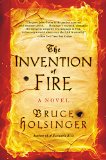Summary | Excerpt | Reviews | Beyond the Book | Read-Alikes | Genres & Themes | Author Bio

This article relates to The Invention of Fire
 Even though Geoffrey Chaucer, medieval England's most colorful and best-known writer is a character in The Invention of Fire, the author Bruce Holsinger chooses the lesser-known poet, John Gower, as his protagonist, relegating the mighty Chaucer to a supporting role.
Even though Geoffrey Chaucer, medieval England's most colorful and best-known writer is a character in The Invention of Fire, the author Bruce Holsinger chooses the lesser-known poet, John Gower, as his protagonist, relegating the mighty Chaucer to a supporting role.
Compared to our knowledge of Chaucer, of Gower we know relatively little. This paucity of information may indeed explain why Holsinger plumped for Gower as his protagonist - a blank canvas is much more inviting to a novelist than one which is already full of color.
Who was the real John Gower? How much of Holsinger's portrayal is based in fact, and how much is the work of fertile imagination? We tease out truth from possible fiction here.
Facts
Holsinger's Gower is a Londoner, living just outside the city in the then relatively new borough of Southwark, on the south bank of the Thames. The real John Gower also lived in Southwark, in the shadow of the impressive Southwark Cathedral (then known as St. Mary Overie), where he is buried in an imposing tomb.
In the book, we discover Gower is afflicted by a "creeping blindness." "I am not blind yet," he tells us, "not just yet, though I am well on my way." It is believed Gower did lose his sight incrementally, and by around 1400 until his death eight years later, he was completely sightless.
The fictional Gower is a man of means, his purse always overflowing with silver groats and gold nobles (medieval English coin currency) with which to bribe his fellow Londoners for information. The actual Gower was affluent too, although both in the book and in real life, it is unclear where his wealth originated from.
Fiction
The Gower in The Invention of Fire is portrayed as a "versifier" whose work gains less acceptance and acclaim than Chaucer's, his close friend and confidante. He spends little time writing, preferring to devote his considerable acumen and energy to his other profession. By his own admission, he is "a conniver and extractor [of information]"; in other words, a trader of secrets, a blackmailer and a spy.
That Gower was a lesser poet than Chaucer, as hinted at in the novel, is a matter of opinion. While Gower's work may not be as well known as The Canterbury Tales, his contribution to medieval literature is far from insubstantial. Certainly he wrote more prolifically than is implied in The Invention of Fire, composing long, lyrical and satirical poems in Latin, French and Middle English, most notably "Vox Clamantis" (The Voice Of One Crying Out), "Mirour de l'Omme" (The Mirror of Mankind), and "Confessio Amantis" (the Lover's Confession) respectively. His abilities were recognized during his lifetime - like Chaucer, Gower enjoyed royal patronage which in itself is indicative of success.
In The Invention of Fire Holsinger substantially deviates from historical fact in his casting of Gower in the role of blackmailer and spy. There is no evidence that he ever dabbled in these dark arts. But then, a little poetic license can often go a very long way in the best historical fiction.
Picture of John Gower from Shakespeareandhistory.com
Filed under Books and Authors
![]() This "beyond the book article" relates to The Invention of Fire. It originally ran in May 2015 and has been updated for the
February 2016 paperback edition.
Go to magazine.
This "beyond the book article" relates to The Invention of Fire. It originally ran in May 2015 and has been updated for the
February 2016 paperback edition.
Go to magazine.
Your guide toexceptional books
BookBrowse seeks out and recommends the best in contemporary fiction and nonfiction—books that not only engage and entertain but also deepen our understanding of ourselves and the world around us.